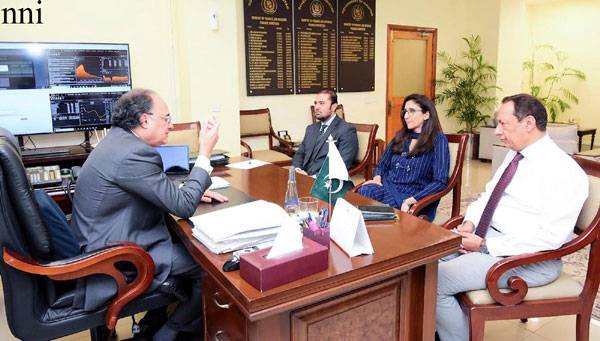ISLAMABAD – Finance Minister Muhammad Aurangzeb on Wednesday expressed satisfaction with the pace of the government’s talks with the International Monetary Fund (IMF), saying the negotiations were progressing ‘positively’.
Speaking to the media in Islamabad, the finance minister stated that the government was confident of boosting Pakistan’s tax-to-GDP ratio to 11 percent.
“We want to get FBR tax to gross domestic product (GDP) of 11 per cent by the end of this fiscal year,” he said. “We want to remain very committed to that target. As you know, there are certain pending court cases … let’s see how the court decides and that can help bridge some of this gap.”
“So far, so good,” Aurangzeb said. The EFF is undergoing its second review, while the RSF is being reviewed for the first time.
When asked about the reviews and whether they will conclude by October 8, Aurangzeb said: “Whatever discussions are happening, they are moving in the right direction.”
Mentioning several pending tax-related cases in courts, he hoped that such cases would increase the Federal Board of Revenue’s (FBR) collections.
The FBR faced a shortfall of Rs1.2 trillion against its original target of Rs12.97 trillion for fiscal year 2024-25, despite the imposition of Rs1.3 trillion in additional taxes.
The board ultimately collected Rs11.74 trillion after two downward revisions, with officials attributing the gap to unrealised recoveries of Rs250 billion from pending court cases.
Aurangzeb, however, said that the government was not considering taking additional tax measures.
“We are not immediately taking additional tax measures,” he said.
In May this year, the IMF board approved a fresh $1.4 billion loan to help Pakistan strengthen its economic resilience to climate vulnerabilities and natural disasters. However, the disbursement of funds is contingent upon successful completion of reviews under the EFF, an IMF official said.
The opening session of the IMF talks which kicked off on Monday was attended by key economic stakeholders, including the State Bank of Pakistan governor, finance secretary and chairman of the Federal Board of Revenue (FBR).
While power sector benchmarks for the end-June 2025 period were comfortably met, revenue collection fell short by about Rs1.2 trillion — almost 1pc of GDP — in the last fiscal year, and the first two months of the current fiscal year have shown similar shortfalls.
The mission will remain in Pakistan for almost two weeks and will also hold forward-looking discussions with the authorities to push for faster implementation of the end-December 2025 targets.
Upon the successful completion of the review, Pakistan will be eligible for the disbursement of about $1bn (760 million Special Drawing Rights) by the end of next month.
In an earlier briefing to the Senate Standing Committee on Finance and Revenue, Aurangzeb said that the Finance Division would take over the duty to prepare the Finance Bill for the next fiscal year.
The finance minister said that the Tax Policy Office (TPO) at the Finance Division will replace the FBR in the making of the next Finance Bill.
In a separate interview with Bloomberg News, Aurangzeb said that Pakistan was planning an investor conference in Washington later this month.
